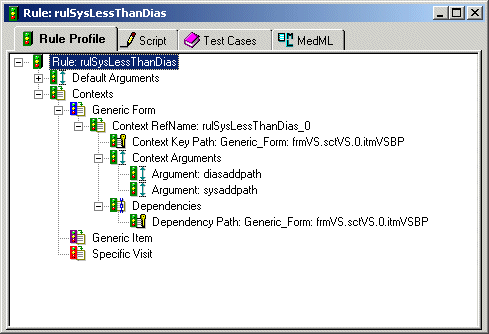Rule Profile tab
The Rule Profile tab enables you associate a rule with the form items it checks or depends on to perform a test or calculation. This tab is organized as a hierarchical list showing a rule and its contexts, dependencies, and arguments:
- Contexts—Defines the item it is evaluating or calculating and all items on whose values the rule script depends. A rule can be associated with different items on different forms and thus have many contexts. The key path of a rule context specifies the visit, form, section, itemset (if applicable), and item against which the rule runs.
There are three types of rule contexts:
- Generic Form—Associates the rule with a form and runs the rule in every instance of the form in the trial. Use this context when you want the same rule to run on every instance of an item on a particular form throughout a trial.
- Generic Item—Associates the rule with a particular item and runs the rule with every instance of the item in the trial. Use this context when you want the rule to run on every instance of an item throughout the trial.
- Specific Visit—Associates the rule with one item in one visit. Use this context to attach a rule to a single item on a form for a specific visit.
- Dependencies—Part of the definition of a rule context is the set of items on which the rule script depends. A dependency consists of a key path that specifies the visit, form, section, itemset (if applicable), and item RefNames of the dependent item. The rule context is also the primary dependency. A rule can also have additional dependencies if its logic uses the values of more than one item.
- Arguments—Specify values that are passed to a rule script when it executes. A rule has a set of default arguments. Additionally, each context has its own set of arguments. The values of context-specific arguments override the values of the default arguments.




